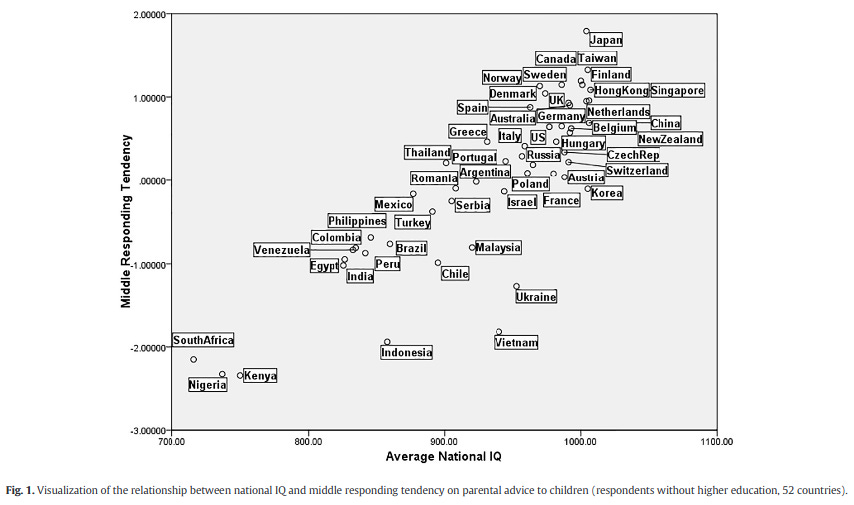Predicting aggregate intelligence level from non-cognitive data
Follow-up to my recent post on machine learning psychometrics. Some years ago, I read this paper by Gerhard Meisenberg:
Meisenberg, G., & Williams, A. (2008). Are acquiescent and extreme response styles related to low intelligence and education?. Personality and individual differences, 44(7), 1539-1550.
Several lines of evidence suggest that acquiescent and extreme response styles are related to low education or low cognitive ability. Using measures constructed from the World Values Survey, this hypothesis is examined both in comparisons among individuals and comparisons among countries. At the individual level, both acquiescent and extreme responding are positively related to age and negatively to education and income in most world regions. Both response styles are most prevalent in the less developed countries. At the country-level, extremity is best predicted by a low average IQ in the country, and acquiescence by a high level of corruption.
While they advocated caution in use of these non-cognitive data (also in a follow-up paper), there is another way to look at it: Minkov, M. (2017). Middle responding: An unobtrusive measure of national cognitive ability and personality. Personality and Individual Differences, 113, 187-192.
Response style - the tendency to provide uniform answers to questionnaire items regardless of item content - is seen as a challenge in psychology and sociology studies. It is an especially serious issue in cross-cultural research as different cultures exhibit different response styles, compromising construct comparability. Response styles have been associated with a variety of personality and cultural characteristics, including intelligence. This study analyzed new data from 44,096 respondents chosen probabilistically from 52 countries. At the national level, a specific type of middle responding - avoidance of categorical opposites and preference for an “in-between” option - is exceptionally strongly related to national IQ (r = 0.80 to 0.91, depending on sample and item type). In conclusion, (1) middle responding can be a valid proxy measure of national cognitive achievement, and (2) a low national IQ reflects the prevalence of a simplistic and rigid personality, whereas a high IQ reflects a fluid, dynamic, and adaptable personality that seems able to morph in accordance with situational factors. This finding creates new dilemmas in cross-cultural psychology and provides a new perspective on the way that nations cope with the challenges of the modern world.
Main plot:

Nice 1100 IQ While this study is super basic, there are many large datasets that probably have subnational measures of all kinds of random stuff. For instance, the recent dataset on time preferences and other non-cognitive traits has subnational data (Global preference study), the various World Values Surveys, European Values Surveys, and so on. Optimally, one could combine all these data, train models to predict intelligence (or 'broad cognitive ability') at the national and subnational units with existing data, then predict into the subnational units without existing data on the same scale. This would probably take a month's work or so. Good project for a good graduate student.

